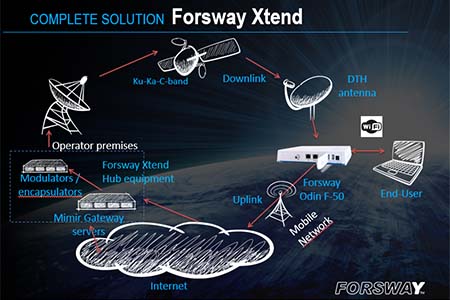Forsway provides hybrid connectivity for rapid, cost-efficient delivery of satellite broadband to the under-served areas of the Middle East, Africa and South Asia.
 Forsway, which provides solutions tapping satellite and existing terrestrial technologies to enable cost-efficient broadband, will showcase the Forsway Xtend complete ecosystem for providing hybrid connectivity at CABSAT.
Forsway, which provides solutions tapping satellite and existing terrestrial technologies to enable cost-efficient broadband, will showcase the Forsway Xtend complete ecosystem for providing hybrid connectivity at CABSAT.
Forsway Xtend is a complete ecosystem that combines satellite with terrestrial networks enabling service providers to tap unused bandwidth. Operators can rapidly deliver cost-efficient broadband internet services to regions lacking reliable access, suffering from underperforming mobile data and ADSL services. On-site solutions and demonstrations at CABSAT will also showcase Forsway’s Xtend Hub including the robust Mimir Gateway operator terminal, and the high performance Odin F-50 hybrid satellite router, Forsway?s customer premises equipment:
Tobias Forsell, CEO of Forsway said: ?Our complete Xtend offering to satellite operators, DTH providers, mobile network operators and telcos who strive to offer broadband also in areas where connectivity is an issue due to insufficient coverage or congestion will be demonstrated. During CABSAT, the Forsway team will demonstrate how the company has recently solved connectivity issues in Manila and Malaysia, Zimbabwe and Senegal, Assam and Abuja, together with leading satellite partners.
?Additionally, we will demonstrate how local communication services providers, ISP?s and systems integrators can benefit from investments in Forsway platforms carried out by leading satellite operators. Our satellite partners now offer managed services that can be locally re-sold to households, SME?s, government offices, health clinics, schools and NGO?s ? even for customers located in under-serviced areas.?
Broadband access will drive growth and prosperity in rural regions, however, cost-efficient broadband solutions are needed to connect hard-to-reach regions. Tapping internet over satellite, Forsway is providing hybrid technology that uses considerably less satellite capacity than VSAT and reduces total cost of ownership for operators aiming to service under-served regions.
















































































